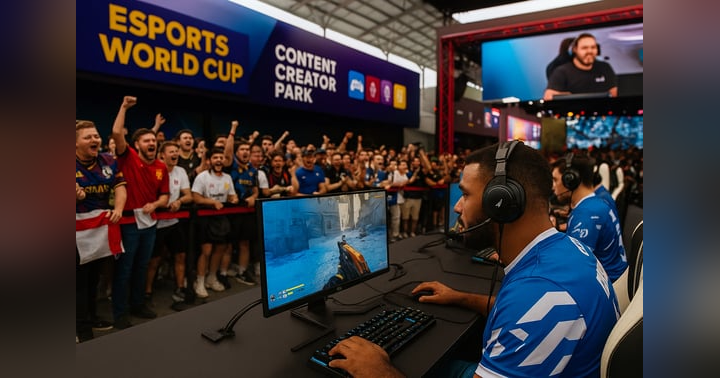How Different Is Esports From Traditional Sports?

Featured image: Microsoft Copilot
Esports represents the segment in the gaming industry that is focused on the professional levels of competitive video gameplay which aims at the aspects of viewership, production and rivalry. The way to view esports is to replace a traditional contact sport (football, boxing, wrestling, etc) and have them replaced with two or more professional gamers playing against each other on a console or PC, and every factor left the same. This means production standards are kept the same: broadcasting, advertising, analytics, marketing, performances and more.
What Are The Similarities Between Esports and Traditional Sports?
Photo credit: Microsoft Copilot
Traditional sports and esports may seem as though they are worlds apart, but the activities are quite similar to the competitive spirit they show amongst traditional and professional gamer athletes:
- Avenues of healthy competition: The goal with playing a sport is to win, and for traditional and esports they share the same intent; be it online or on the field, in the end, someone has to win. The sense of competition is instilled in either form of sport, and that happens through discipline, self-improvement and fair play.
- Either sport follows rules: The adherence of rules in sports is a universal thing that all players must follow; be it a pickup basketball game or an online game of Pro Evolution Soccer. Traditional sports use referees and umpires to enforce rules while esports use anti-cheat software.
- Equipment: While traditional sports mostly require specific equipment: bats, balls or sticks, esports similarly uses equipment such as consoles or PCs, headphones, controllers or keyboards, and monitors.
- Skill level required: To better at traditional sports or esports, there is the need to be constantly improving oneself in skill through necessary training. That way you secure yourself a shot at getting a lot of play time and also land higher rankings with statistics from gameplay/tournaments.
- Played as teams or individuals: Just like traditional sports have competitions between individuals and teams, so does esports. The number of players is dependent on the game and the tournaments’ rules.
What Are The Differences Between Esports and Traditional Sports?
Photo Credit: Microsoft Copilot
Although traditional sports and esports have a set of existing similarities, there are some critical differences to note between them:
- Lack of physical exertion: Traditional sports by nature have a physical activity that is integral to their identity. Track and field events, swimming, football come with a physicality and intensity with bodies having to move in a manner and direction exclusive to the rules that come with them. The absence of this exertion is what esports faces, since being physical is not much of a demand for gamers and more work put into hours of being in stationary positions.
- Public perceptions: The acceptance of esports is significant across different cultures. While in some regions where esports players are celebrated just like traditional athletes, there are other regions that have not given in yet to esports players being athletes. This is because societies’ definitions for the word “athlete” come with a certain sense of physical activity and talent that makes them wary of considering the desk-bound nature of esports as a traditional sport.
- Government support: For traditional sports, seeking support from the government to fund tournaments is not much of a hassle since there is international acceptance with most of them. Esports on the other hand due to the mixed acceptance internationally goes through a series of enquiries and somewhat investigations to say the least when pursuing governments for support. Budget presentations, conferences and series of lobbying have to be done to secure spaces to organize events, alongside other legal issues which could include age restrictions, game titles selected for tournaments, and esports betting. Esports faces a more stringent procedure with organizing events unlike traditional sports.
- Health concerns among players: In traditional sports, physical activity and fitness is considered strongly, whereas in esports it is a more seated situation, with prolonged periods of being in a chair. Health issues such as obesity, poor posture, trigger finger, muscle strains, low back strains amongst other musculoskeletal disorders (disorders or injuries associated with the muscles, nerves, tendons, joints, cartilage and spinal discs) can affect esports players, as a result of the lifestyle of sitting for prolonged periods. Thankfully there are exercise routines and wellness programs that esports players can sign on to to prevent these issues from happening frequently.
- Longevity: Traditional sports have a shorter career span because of the decline in physical abilities that come with age, and the potential injuries that follow should it be kept going. As a result players have to retire in their 30s or 40s and maybe render valuable services such as coaching, team management or analytics. For esports, players can have a longer career span because there is not much physical activity and the chances of landing injuries are lesser. The challenge however, is with updates with the games and consoles or PCs and other related technology. Esports players are to be able to adapt to these changes and navigate the technology that comes with it, alongside the audiences and competitors. The unpredictability could also lead to an early retirement or a switch in games or genres.
- Ownership: Traditional sports have a lesser chance of having an entire overhaul occur with games taken away for good unlike esports. This is because with esports game publishers can change, due to ownership issues, which may either have a discontinuation or a title change with upgrades that can potentially shut down tournaments built around these games. Players may then have to switch to other games or genres and continue from there; probably a minor or major challenge to players and event organizers, but since there are still games being published, esports will still be in the conversation. In the case of football, tennis, basketball, track and field events among among other traditional sports it is unlikely they will face shut downs anytime soon until sports committees say otherwise, but that may be limited to certain rules and regulations
Conclusion
The conversation on esports players considered as professional athletes makes its case with the changes we see in the digital age. The mental training, physical activity and discipline mirrors that of the traditional sports, but the lack of physical exertion is what makes a counterargument on the consideration. Nonetheless fans are giving room to accept both sports and celebrate them with the uniqueness they bear in physical and digital athleticism.
Esports has helped create jobs for lots of people. Interested in knowing about the business side of esports? Listen to the Gamers Change Lives Podcast! We get experienced guests from all around the world featuring.
Written by Jeffrey Osei-Agyeman









